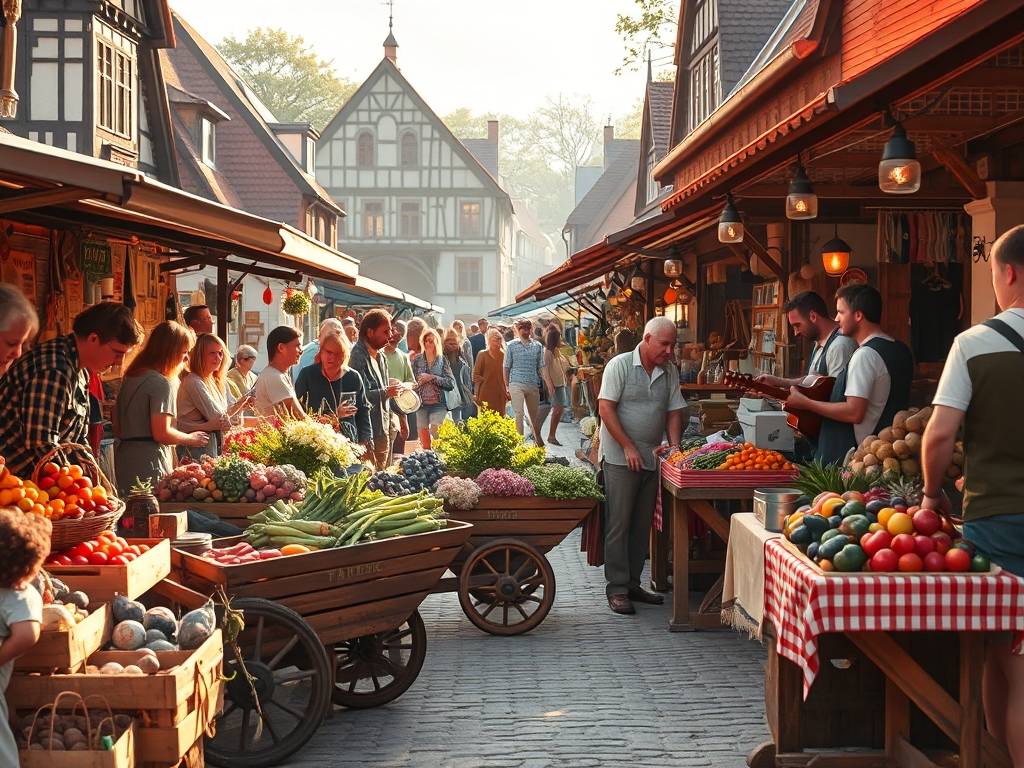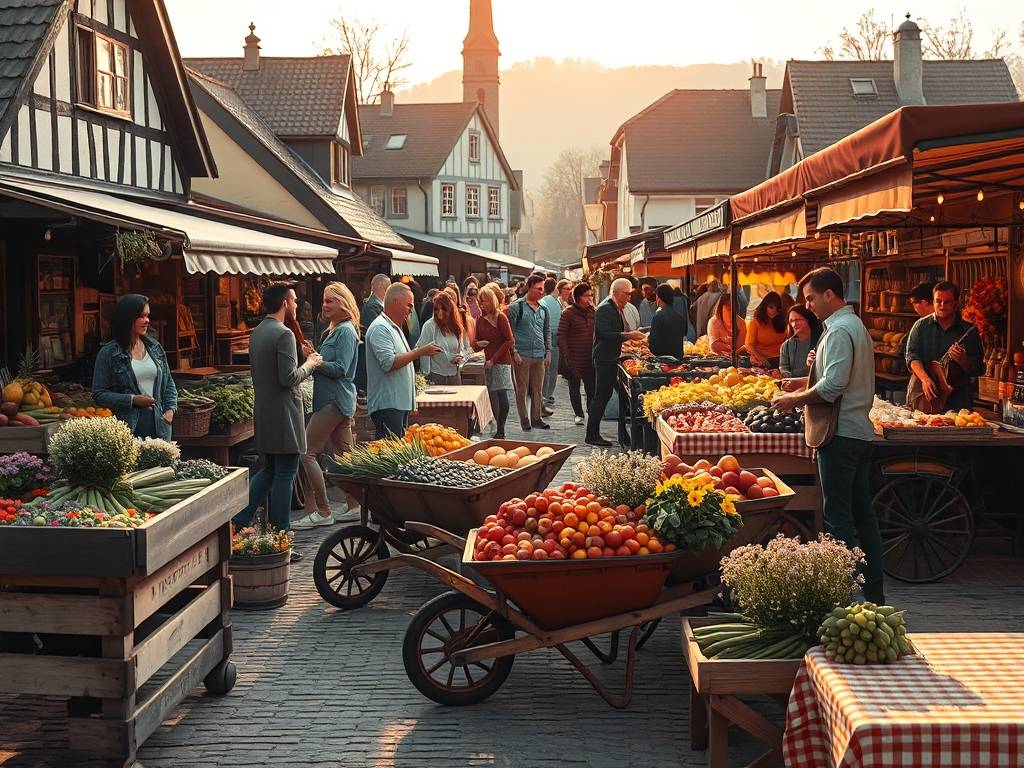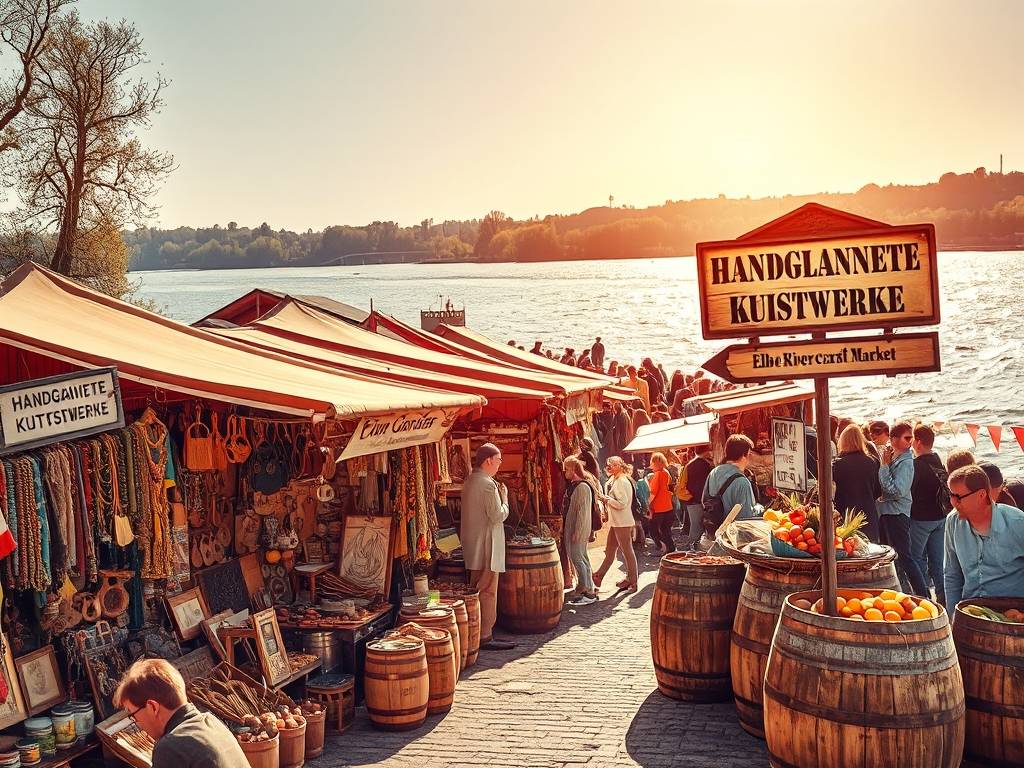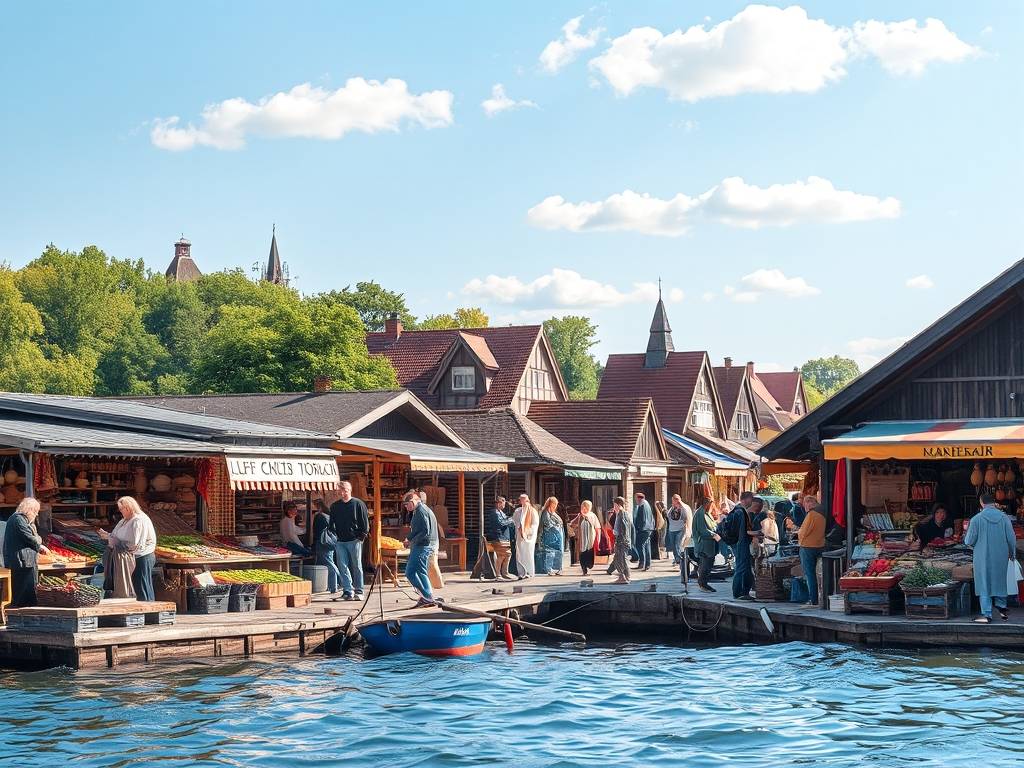Global Travel Information
Elbe River Farmers Markets: Buy Local Food & Drinks
A Taste of Tradition: Savoring the Local Flavors Along the Elbe River's Farmers Markets
The Elbe River, a silver ribbon winding through the heart of Europe, is more than a geographical feature; it is a lifeblood. From the sandstone peaks of Saxon Switzerland to the vast, windswept plains of its northern reaches, the river has shaped landscapes, cultures, and cuisines for centuries. To truly understand the soul of this region, one must move beyond the grand cathedrals and historic castles and step into its vibrant, bustling town squares. Here, on specific days of the week, unfolds a timeless ritual: the farmers market. These are not merely places of commerce but the living, breathing kitchens of the Elbe Valley, where the concept of "local" is not a trendy label but a simple, enduring fact of life.
The journey of discovery can begin in the magnificent city of Dresden. Rising from the ashes of its wartime destruction, Dresden’s Altmarkt (Old Market) square hosts a market that is a testament to both resilience and tradition. Against a backdrop of the stunning Frauenkirche, stalls overflow with the bounty of the surrounding Lößnitz hills and the fertile Elbe meadows. The air is thick with the scent of freshly baked bread, a cornerstone of German life. Here, one finds not the uniform, plastic-wrapped loaves of a supermarket, but a dizzying array of Bauernbrot (farmer’s bread), dense, dark rye loaves, and crusty rolls studded with sunflower seeds and pumpkin seeds. Cheesemakers from the Ore Mountains (Erzgebirge) offer sharp, aromatic mountain cheese (Bergkäse) and creamy, delicate varieties, often allowing customers a taste before they buy. In autumn, the market transforms into a harvest celebration, with pyramids of pumpkins, baskets of wild mushrooms foraged from nearby woods, and the sweet, vinous perfume of ripe plums destined to become the region’s famous Pflaumenkuchen (plum cake). The Dresden market is a lesson in Saxon terroir, where history and horticulture are inextricably linked.

Traveling downstream, the city of Meissen, perched elegantly above the river, is globally renowned for its exquisite porcelain. Yet, its weekly market, huddled in the shadow of the Gothic cathedral and Albrechtsburg castle, offers a different, more immediate kind of artistry. The focus here is on precision and quality. Orchards on the sun-drenched slopes of the Elbe Valley produce some of Germany’s finest fruits, and the market is the primary showcase. Apricots, peaches, and cherries, their flavors intensified by the unique microclimate, are sold by the very families who have tended the trees for generations. But Meissen’s true liquid treasure is wine. The Elbe Valley is Germany's northernmost wine region, and the vineyards terraced along the riverbanks produce distinctive white wines, primarily from the Müller-Thurgau and Riesling grapes. At the market, local vintners set up small stalls, offering glasses of their crisp, elegant wines. To sip a glass of Meissner wine while looking out over the very vineyards that produced it is an experience that encapsulates the essence of place. It is a taste of the river, the soil, and the Saxon sun.
Further north, as the landscape flattens and the river widens, the character of the markets shifts. In the vibrant port city of Hamburg, the historic Fischmarkt (Fish Market) is an institution, a spectacle that begins when most of the city is still asleep. Every Sunday morning, as dawn breaks over the Elbe, the cavernous fish auction hall and the surrounding streets come alive with a cacophony of sound. Fishmongers, their voices hoarse from a long night’s work, auction off crates of North Sea shrimp, plaice, and mackerel with theatrical flair. The energy is infectious, a blend of commerce, performance, and community gathering. While the catch comes from the sea, the market itself is deeply connected to the Elbe, the vital waterway that links the city to the world. Alongside the fish, stalls sell local honey from Hamburg’s outskirts, artisanal cheeses from Schleswig-Holstein, and bunches of fresh flowers. For many, the market is not complete without a breakfast of Brötchen with fresh shrimp and a glass of Pharisäer – a potent coffee-and-rum concoction – a perfect remedy for the early morning chill and a testament to the city’s seafaring spirit.
Venturing into the biosphere reserve of the River Elbe Meadows, the markets become smaller, more intimate affairs. In towns like Lauenburg or Hitzacker, the weekly market might consist of only a dozen stalls clustered around the town hall, but the connection between producer and consumer is at its most direct. Here, you can meet the farmer who raised the free-range chickens whose eggs you are buying. You can discuss the best way to cook a particular cut of lamb with the shepherdess who tends her flock on the river’s dikes. The offerings are a reflection of the unique ecosystem: asparagus from the sandy soils, potatoes, and a surprising variety of organic vegetables. These markets are the antithesis of industrial agriculture; they are slow, personal, and deeply rooted in the sustainable practices necessary to preserve the fragile river landscape.
The culinary delights of these markets are not limited to raw ingredients. They are also a paradise for those seeking ready-to-eat local specialties. A must-try is the iconic Sächsische Quarkkeulchen (Saxon quark pancakes), a deliciously sweet treat made from potatoes, quark cheese, and raisins, fried until golden brown and dusted with cinnamon sugar. In the Lüneburg Heath region, influenced by the Elbe’s proximity, one might find Buchweizenpfannkuchen (buckwheat pancakes), a heartier, savory option. Sausages, of course, are ever-present, grilled to order and served in a roll with a generous squirt of mustard. To wash it all down, besides the excellent local wines, one can find regional beers from small breweries and, increasingly, craft ciders made from local apple varieties.

Beyond the food and drink, the Elbe River farmers markets serve a crucial social function. They are a weekly touchpoint for the community, a place to meet neighbors, exchange news, and slow down. In an age of digital isolation and anonymous supermarket aisles, the market offers human connection and a sense of belonging. It is where traditions are passed down, where children learn where their food actually comes from, and where the rhythm of the seasons is felt most keenly.
To visit an Elbe River farmers market is to embark on a culinary pilgrimage. It is to taste the landscape, from the mineral-rich notes of a Meissen Riesling to the smoky flavor of a Hamburg fish sandwich. It is a journey that engages all the senses and offers a profound connection to the land and its people. In a world increasingly dominated by globalized, homogenized flavors, these markets stand as bastions of authenticity. They remind us that the most memorable meals are not just about sustenance, but about story, place, and the simple, profound pleasure of buying a carrot from the person who pulled it from the earth that very morning. They are, in every sense, the true taste of the Elbe.
相关文章
- Elbe River Wildlife Safaris: Explore Nature Near the River
- Elbe River Botanical Tours: See Rare Plants & Flowers
- Elbe River Archaeological Tours: Discover Ancient Sites
- Elbe River Historical Walking Tours: Explore On Foot
- Elbe River Cycling Tours: Bike Along Scenic Paths
- Elbe River Driving Tours: Road Trips Near the Waterway
- Elbe River Train Tours: Relax & Enjoy the Views
- Elbe River Bus Tours: Affordable Group Travel
- Elbe River Boat Tours: Guided Excursions on the Water
- Elbe River Helicopter Tours: Aerial Views of the River
发表评论
评论列表
- 这篇文章还没有收到评论,赶紧来抢沙发吧~


